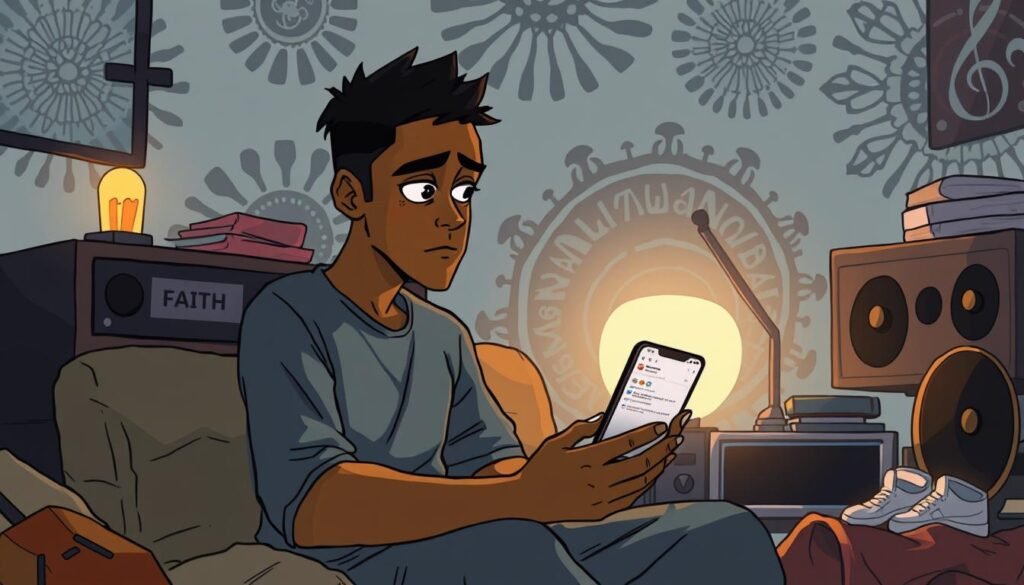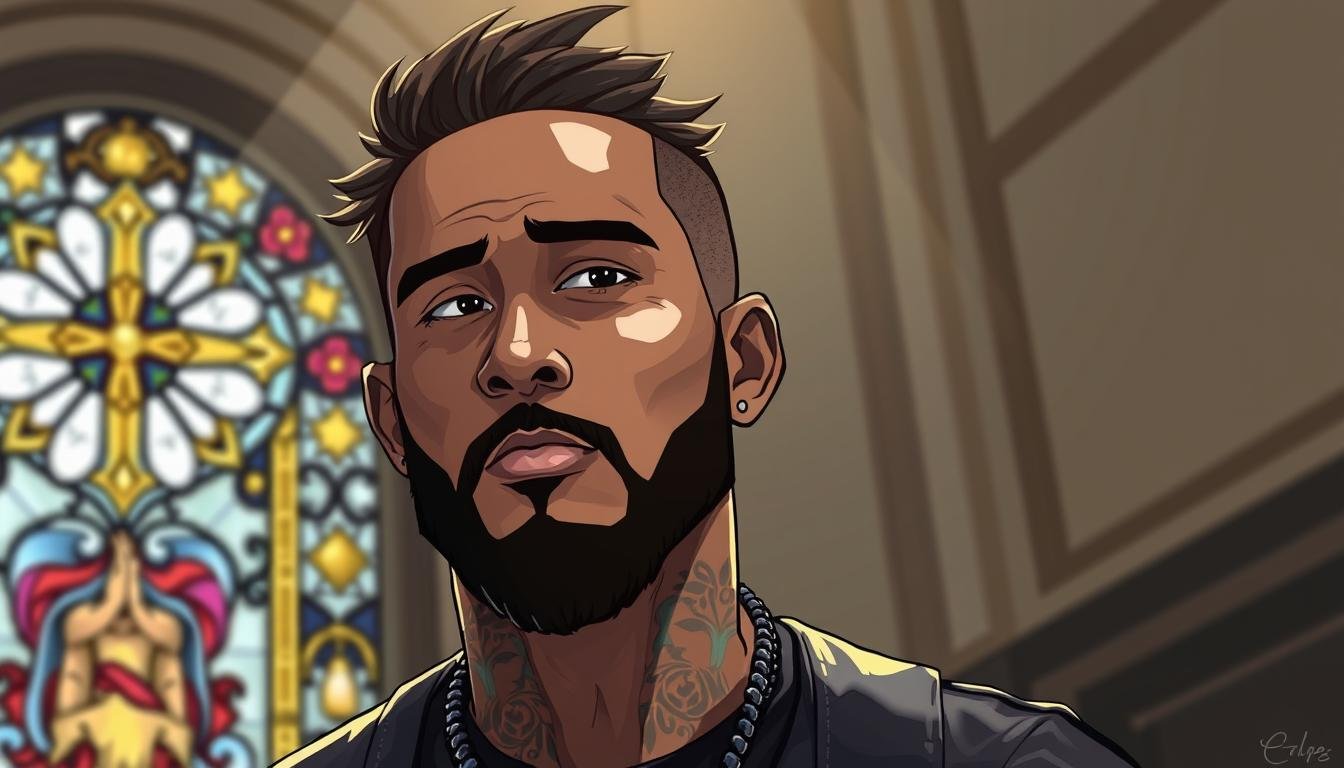Ever think about how culture and beliefs mix in an artist’s life? Abel Tesfaye, known as The Weeknd, is a great example. His Ethiopian roots and immigrant parents’ stories are key to understanding him.
Is he Muslim? This question is both interesting and complex. Exploring his background and beliefs can reveal a lot about his music and message. Let’s dive into his Ethiopian heritage and religious views.
Understanding The Weeknd’s Background
Abel Makkonen Tesfaye, known as The Weeknd, was born on February 16, 1990, in Toronto, Ontario. His parents were Ethiopian Amhara immigrants. This cultural heritage shapes his art.
He grew up in Scarborough with his mother and grandmother. His Ethiopian roots and immigrant experience influence his music and life story.
The Weeknd faced many challenges, like financial struggles. He had to shoplift food and sell marijuana to survive. These experiences add depth to his music, touching on themes of despair and hope.
His songs often deal with faith and belief. He reflects on his Ethiopian Orthodox Christian upbringing and changing views on religion. His journey shows a growth toward embracing his true self. For more on The Weeknd’s faith, visit The Weeknd’s cultural roots.
Abel Tesfaye: The Man Behind The Weeknd
Abel Tesfaye, known as The Weeknd, has made a unique mark in music. His story is complex, shaped by his early life. Born on February 16, 1990, he faced challenges from the start, including his parents’ separation soon after birth.
He dropped out of school to focus on music. His early mixtapes, like “House of Balloons” in 2011, brought him fame. His journey from hardship to stardom is inspiring.
He became the first artist to hit over 100 million monthly listeners on Spotify. By March 20, he had 111.4 million listeners. This shows his art’s global impact.
From a troubled teen to a music icon, Abel Tesfaye shows the strength of perseverance. His story, behind the Weeknd persona, is rich and complex, shaping his music.
Musical Journey of The Weeknd
The Weeknd started his music career in 2009 with a secret identity on YouTube. This mysterious beginning led to his rise to fame worldwide. His mixtapes, *House of Balloons*, *Thursday*, and *Echoes of Silence*, were crucial in his journey.
These early works showed his unique mix of alternative R&B and pop. They deeply connected with listeners. The Weeknd’s music often takes us from darkness to light, with each song marking a key moment.
Looking back, The Weeknd’s success is more than just hits. His music reflects his personal growth and spiritual journey. It’s not just songs; it’s a journey that challenges and touches our emotions.
Is The Weekend Muslim?
Understanding The Weeknd’s religious beliefs means looking at his cultural roots. Born to Ethiopian parents, Abel Tesfaye’s heritage is a mix of Ethiopian culture. This culture is known for its large Muslim and Christian populations.
Growing up as a child of immigrants might shape his views on religion. This is especially true in the entertainment world. His cultural background likely influences his music and personal identity.
The Weeknd’s Cultural Roots
The Weeknd’s ties to Ethiopian culture are deep. They shape his views on faith and spirituality. In Ethiopia, Muslims and Christians live together, creating a rich culture.
This background influences his music, drawing from different religious contexts. His songs talk about love, loss, and big questions. They connect with people from many spiritual backgrounds, showing how important personal identity is to him.
Exploring The Weeknd’s Ethiopian Heritage
The Weeknd’s Ethiopian roots deeply shape his music. Growing up, Abel Tesfaye was surrounded by Ethiopia’s rich traditions. This background influences his lyrics and sound.
His connection to Ethiopia gives him a special way to share emotions. He mixes personal stories with cultural tales.
Influence of Ethiopian Culture on His Music
Artists from Ethiopia face challenges in the music world. East African artists, like The Weeknd, are underrepresented. But, Ethiopian culture’s mark is clear in their music.
These artists, known as “Habeshas,” create a unique sound. They mix traditional instruments with modern styles. This enriches music worldwide.
The Weeknd started XO Records to support diverse talents. Ethiopian artist Chxrry22, for example, explores duality in her music. Joony’s music is inspired by his upbringing, showing the Ethiopian diaspora’s creativity.
Berhana blends Ethio-jazz with alternative R&B. This shows the deep cultural influence in their music.
Artists like Alemeda and RIMON use their Habesha heritage. They talk about mental health, showing Ethiopian culture’s wide impact. The Weeknd supports these artists, showing the value of heritage in music.
Together, these artists show the beauty of Ethiopian culture. They prove that identity and art can blend in powerful ways.
The Weeknd’s Views on Religion
Abel Makkonen Tesfaye, known as The Weeknd, weaves faith and spirituality into his music. He grew up in a very religious Ethiopian Orthodox Christian home. Yet, his views on religion are complex and often public.
His song “Faith” is a key example. It tells of his personal struggles and self-destruction around 2013-2014. The song shows his emotional turmoil and questions about faith.
The lyrics show a character fighting with himself. They vividly describe losing faith and seeking comfort in heartbreak. This introspection is a big part of his music.
Turning 30 was a turning point for The Weeknd. He wanted to move on and grow. He saw it as a chance to become the person he was meant to be.
In interviews, The Weeknd talks about his faith journey. He has moments of acceptance and resistance. His donation to St. Mary Ethiopian Orthodox Church in Toronto shows his connection to his heritage.
His music invites listeners to think about their faith and spirituality. It’s a personal and thematic exploration.

Has The Weeknd Identified with Islam?
The Weeknd’s music shows deep themes of identity and spirituality. He hasn’t said if he’s Muslim, but his songs hint at it. This makes us wonder how his beliefs shape his art.
Many artists, like Kevin Gates and PnB Rock, openly share their Muslim faith. This sparks a conversation about how culture influences art.
The Impact of Personal Beliefs on His Art
The Weeknd’s music tells stories of struggle and success. It shows the ups and downs of life. Artists like French Montana show how their past shapes their music.
Thirteen emcees proudly share their Islamic faith. This diversity enriches our understanding of faith and identity in music.
Talking about artists’ beliefs adds depth to their work. Black artists face challenges in the correctional system. This makes inclusive music talks on faith even more important.
Edward Lee Jones, Jr. faced censorship of works by artists like The Weeknd. This shows how barriers limit cultural stories that touch on spirituality and society.
Muslims in the Music Industry
The music industry is full of diversity, with Muslims playing a key role. About 13 out of 15 artists talked about in recent times became Muslim during their careers. This shows how faith impacts a field often seen as secular.
Looking at representation of Muslim artists, we find many American rappers and hip-hop stars. Their stories vary, from converts to lifelong Muslims. This diversity enriches the music world.
Nine artists have shared how Islam influences their lives. Five of them mention the Five-Percent Nation’s impact on their music. Three artists talk about sticking to Islamic values, facing industry challenges along the way.
Artists like SZA and Raekwon have Muslim backgrounds. This shows a deep connection between faith and music. Their experiences add to the richness of the industry.
The 1985 to 1995 rap era saw a big influence of Islam. Artists like Mos Def (Yasiin Bey) were inspired by Malcolm X. Today, Muslim rappers and poets keep exploring Islam’s role in hip-hop.
Despite their big impact, Muslim artists face unique hurdles. Scholars debate music’s place in Islam. Artists try to balance their music with their faith, sparking important discussions.
The Weeknd’s Public Statements About Faith
The Weeknd’s public faith statements show a lot about his beliefs and how he presents himself. In The Weeknd interviews, he talks about spirituality, inspired by his Ethiopian roots. His songs often deal with faith, identity, and emotional ups and downs.

On social media, The Weeknd connects with fans, hinting at his beliefs. His posts share common struggles and victories, touching many hearts. This mix of art and public statements makes fans curious about his faith journey.
Interviews and Social Media Posts
The Weeknd’s songs, like “Faith” and “Coming Down,” show his deep thoughts on spirituality. These songs talk about despair and finding hope, themes he also discusses on social media and in The Weeknd interviews. His music lets him share his beliefs in a way that invites interpretation.
It’s interesting to see how The Weeknd balances his personal beliefs with what the public sees. In a world seeking real connections, his blend of faith and art is especially meaningful. His journey continues to shape his story and connect with fans.
Being an artist with Ethiopian Orthodox Christian roots, his faith deeply influences his music and public image. This connection is worth exploring, offering a glimpse into the person behind the songs.
For more on these themes, check out this detailed analysis on religious resonances in The Weeknd’s halftime show.
Upcoming Work: The Weeknd’s Future Projects
The Weeknd is still winning fans with his amazing talent and fresh music ideas. His new projects will show off his growth as an artist. The album “Hurry Up Tomorrow” is a big deal, ending a trilogy started with “After Hours” and “Dawn FM.”
Each album in this series is a big step forward. They make The Weeknd’s music connect deeply with listeners.
He has made a big splash worldwide, breaking records with his songs and albums. The Weeknd is known as a top artist, thanks to his work with Universal Music Group. Fans are excited to see what he does next, as it will show his growth and new sounds.
He’s also planning tours, like the After Hours Til Dawn Stadium Tour. This tour will let him share his music with more people. It’s a chance for him to share his personal and musical journey. Fans can’t wait to see what themes and sounds he’ll bring in his future music.
Significance of Beliefs in Pop Culture
Today’s pop culture shows many beliefs, especially from artists. The Weeknd is a great example. His music and image show how beliefs touch many people. He talks about love, loss, and spirituality, making fans think about faith.
Artists like The Weeknd are key in today’s media. They share their beliefs through their stories. This can start big talks on faith and right and wrong. For Muslims, giving to charity, family, and spiritual growth are key. Art can celebrate or question these, starting deep talks on faith.
The power of beliefs in pop culture is huge. It can bring people together. Artists share their views, making us think about our own beliefs. This helps us understand each other better and feel connected through art.
FAQ
Is The Weeknd Muslim?
What influences The Weeknd’s music?
Does The Weeknd talk about religion in his songs?
How does The Weeknd’s cultural heritage affect his identity?
What are The Weeknd’s future projects?
How do Muslim artists navigate the music industry?
What can we learn from The Weeknd’s public statements on faith?

Embracing Faith, One Insight at a Time!
The teachings of the Quran have always guided my path. With a deep passion for Islamic knowledge, I strive to blend the wisdom of tradition with the relevance of today, making the timeless messages of Islam accessible and meaningful for everyone.
Muslim Culture Hub is my platform to share historical insights and thought-provoking articles, exploring both well-known and lesser-discussed aspects of Islamic culture and beliefs. My mission is to create an inclusive online space where everyone can learn, strengthen their faith, and connect with the profound message of Islam.
Join the journey!
May peace be upon you.








